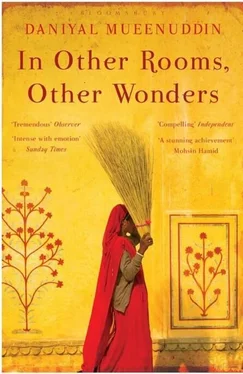Servants had crowded into the hallway outside the room, perhaps twenty of them, barefoot and speaking in whispers, coming into the house by ones or twos as they learned that something had happened to the master.
The general swept in, a tall anglicized officer, his trimmed mustache and the severe cut of his clothes reflecting purpose. Rafik, who knew the general well, brought a stool. Administering an ECG on a portable machine, the general took the tape to the light, and said, ‘Go immediately to Mayo Hospital. Carry him out in a chair.’ He clicked shut the lid of the machine and put the tape away in the pocket of his vest.
For a moment Husna and K. K. looked at each other, his face lined and grave, hers puffy with sleep. For the first time he thought of her as a grown-up, as a woman; and for the first time she thought of him as a lover, sick and possibly dying.
All the servants, the gardeners, the chauffeurs, the junior ones who saw K. K. only from a distance, wanted to help carry the chair through the corridors of the house, where only a few lights burned, throwing shadows. K. K. sat impassively on the chair, raised above the crowd, then lowered at the doors, like an awkward king, a king onstage.
As Husna prepared to get into the car, the general stopped her. ‘You need to be here. People will be coming to ask about him. He’s probably going to be all right, but you should call Sarwat and the others. Kamila should come back from New York. Have them call Rehana also.’ Rehana, the middle child, had broken with K. K. when he separated from his wife. Husna began to cry, shaking, and he stood back and looked at her shrewdly. ‘Don’t, this isn’t about you. Prepare yourself now. Remember who you are.’
By midmorning people had begun to call at the house, for in Lahore word traveled quickly. Husna received them, sitting in the living room. She had dressed up too much, wearing an embroidered black kurta . Several of the guests asked about Sarwat.
Sarwat had ordered that a car should wait at the airport and meet each flight from Karachi, as she would get a seat as quickly as possible. Just before lunch she entered the living room, narrowing her eyes. An elderly couple, who had been sitting with Husna, stood up.
‘What’s happened?’she asked, addressing Husna. ‘What are you doing here? Where’s Daddy?’
The old couple quickly took their leave as Husna explained.
‘Please,’said Sarwat, ‘this is a time for family. I’ve asked my cousin Bilqis to come here and receive people. Go up to your room and stay there.’
Husna didn’t dare tell Sarwat that she had moved next to the master bedroom. A servant turned on the air conditioner in the annex, and Husna stayed there all day, looking down through the window at callers arriving and leaving. Hassan sent up some food, but she didn’t eat. She knew she would not be allowed to attend K. K. at the hospital.
In the middle of the night she fell asleep, still sitting in the chair by the window. Waking in the morning, she looked down at the driveway jammed with cars. Without even putting on a dupatta , she ran down the stairs and into the servants’ area. Rafik sat on a chair sobbing unnaturally, as if racked with coughing, his head in his hands, his elbows on his knees. She saw very distinctly the old man’s bare head, bowed down, the gray thin hairs, the scalp. She knew, of course, that K. K. had died. Two other servants, young ones new to the house, sat uncertainly on their haunches nearby. They looked at her with curiosity, but said nothing. She turned, her eyes filling with tears, and walked back to the annex. She lay down on the bed, her feelings concentrated at the forefront of her mind like an immensely weighted black point, incomprehensible.
In Islam a body must be buried as soon as possible, ideally before nightfall. When Husna emerged from her bedroom and looked again out onto the drive, she saw men putting up a tent, where the male guests would mourn during the jenaza . The women would sit inside the house with the body. She unlocked one of her massive trunks, and removed a suit of clothing that she had brought with her when she came into the household, a cheap shalvar and kurta , with a simple white dupatta . Wearing this costume, she entered the living room. The body of K. K. Harouni lay on the floor, wrapped in a white cloth, his jaw bound closed with a white bandage, the knot tied jauntily near one ear. His dentures had been lost, and his cheeks had caved in. His body had shrunk, lying among rose petals scattered by the servants. Sarwat rose from her place at the head of the corpse, touched Husna on the head with both hands, but said nothing. Husna went to the back of the room and sat down as far away as possible from K. K.’s old wife, who was telling a rosary, a stunned expression on her face. All sorts of women had come, women from all phases of K. K.’s life, and more kept arriving, clicking through the front vestibule in high heels, spilling out into other rooms. From various places soft or loud sobbing would break out and then subside, as is the custom. Two society women sat uncomfortably on the floor next to Husna, whispering, gossiping, and she heard one say to the other in English, ‘Oh, isn’t that delicious .’
Of course you don’t care, thought Husna, who wouldn’t cry in front of them. She felt that only she cared, that she had lost more than all the others.
And yet she wanted to be like them, they were what she had lost.
For the next two days Husna stayed in the annex, without once going out. People came day and night to condole with Sarwat and Kamila. Rehana, the estranged third daughter, had arrived from Paris, where she taught some esoteric form of Islamic women’s studies — but she pointedly stayed with her mother rather than at K. K.’s house. Husna felt that they had forgotten her, and she wanted to be forgotten, to stay here alone in these rooms, with their rush mats on the floor, their pieces of scavenged furniture, and an air conditioner that almost kept the apartment cool, dribbling water onto the pavement below. On the third day a servant came, early in the morning, before there were any callers, to say that the sisters wished to speak with her. They were waiting for Husna in the living room, all three wearing saris, relaxed, Kamila sitting with her feet curled under her on a sofa, Rehana and Sarwat in high-backed chairs.
They got straight to the point, Kamila, as the eldest, speaking.
‘My father allowed you to live in this house. However, he would not have wanted you to stay here. Tomorrow afternoon the car will be available to take you wherever you wish to be taken. I suppose you’ll go to your father’s house.’ She settled back, finished with the problem.
Husna, who had taken a seat halfway through this monologue, though she had not been invited to do so, looked down at the floor. Tears welled up in her eyes.
‘Did Uncle say anything about me before … before …?’
Sarwat broke in. ‘No,’ she replied with finality. ‘There was and is nothing for you.’
‘That isn’t what I meant,’ said Husna.
Kamila softened. ‘Look, whatever you had with my father is gone now. If you took care of him in these past months, you were rewarded. You’re young, you’ll find other things. You think that you’ll never heal, but you will, sooner than you think.’
Now Husna stood. She had reached the bottom, and her pride arose, her sense of wanting to be dignified, to accept the inevitable.
Just as she approached the door, Rehana called to her. ‘There’s one other thing. They tell us you have a number of trunks in your room. We will not ask what you have in them. You may take those with you. But nothing else.’
Reaching the annex, Husna sat on the side of the bed and buried her face in her hands. She had hoped that Rehana, the foreign one, the aggrieved one, would take her side — yet it was she who pronounced the harshest words. At the end their estrangements were less than their contempt for her. They had closed up against her — family, blood. She tried to tell herself that she had gone to the sisters hoping for nothing, with nothing in her heart but sadness at the death of their father, who had loved her. She should have said something cold, should have refused their last insulting offer.
Читать дальше












